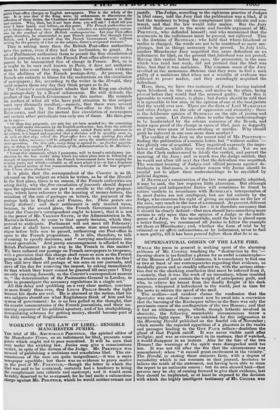WORKING OF THE LAW OF LIBEL: SENSIBLE MANCHESTER JURIES.
THE trial of Mr. ARCHIBALD PRENTICE, the spirited editor of the Manchester Times, on an indictment for libel, presents some points which ought not to pass unnoticed. It will be seen that even under the existing law, Juries may give a conscientious verdict, in spite of the dictum of the Judge. Mr. PRENTICE was accused of publishing a malicious and scandalous libel. The cir- cumstances of the case are quite insignificant,—it was a mere newspaper squabble; but there was no evidence to prove malice on the part of Mr. PneNsice,—though the letter in which the libel was said to be contained, certainly had a tendency to bring the complainant into ridicule and contempt; and it would seem he richly deserved to be so exposed, for he had made a calumnious charge against Mr. PRENTICE, which he would neither retract nor
justify. TheJudge, according to the righteous practice of J udges in libel cases, told the Jury that the publication was a libel, if it had the tendency to bring the complainant into ridicule and con- tempt, and that the law would infer malice. But the Jury yielded their assent to the acute and forcible argument of Mr.
PRENTICE, who defended himself; and who maintained that the averments in the indictment must be proved, not inferred. This is the doctrine of BENTHAM ; who held that where falsehood or
malice is charged, the words are not to be construed as mere sur- plusage, but as things necessary to be proved. In July 1331, another Manchester Jury acquitted this same defendant on an
indictment for libel, on the ground that falsehood was not proved.
Having this verdict before his eyes, the prosecutor, in the case which was tried last week, did not pretend that the libel was
false, but that it was malicious. The common sense of the Jury revolted at the monstrous dbctrine that they were to find a man guilty of a malicious libel when not a scintilla of evidence was adduced to prove malice, and they accordingly acquitted the defendant.
Here, then, we have two instances of Juries having insisted upon falsehood in the one case, and malice in the other, being
proved before they would find the accused guilty. That this is
agreeable to sound sense, is plain ; but Juries should be told that it is agreeable to law also, in the opinion of one of the best jurists
that the world ever saw. There are the dicta of Lord MANSFIELD and other Judges on the side of oppression and absurdity: there is the deliberate opinion of BENTHANI on the side of justice and common sense. Let Juries refuse to suffer their understandings to be hoodwinked by the solemn nonsense of the Bench, and insist upon proof of the charge in cases of libel, just as doggedly as if they were cases of horse-stealing or murder. Why should guilt be inferred in one case more than another?
The verdict of the Jury on the recent trial of Mr. PRENTICE- finding the publication of a certain letter, but "without malice "—
was plainly one of acquittal. They negatived expressly the impu- tation of malice, which they were directed to infer. Yet we see that the Clerk endeavoured to falsify the verdict, and pervert the meaning of the Jury; and so much was the Judge nettled, that he would not allow till next day that the defendant was acquitted. The constant leaning of Judges and official persons against de- fendants in libel cases, is another reason why Juries should be careful not to allow their understandings to be mystified by judicial dogmas.
If BENTHAM'S construction of the law were generally admitted, it may be said, the law requires little alteration. But although intelligent and independent Juries will sometimes be found to return verdicts in accordance with BENTHAM'S interpretation of it, most Juries are not intelligent, but are led entirely by the Judge, who exercises his right of giving an opinion on the law of the case, very much in the tone of a command. At present, different interpretations are put upon the law : it is therefore necessary that it should be clearly defined—that rnen should have something more certain to rely upon than the opinion of a Judge or the intelli- gence of a Jury. In the meanwhile, until the law is placed upon a better footing, we recommend all Juries to follow the example set them at Manchester ; and, whether the form of trial be by criminal or ex officio informations, or by indictment, never to find a man guilty, till it has been proved before them that he is so.


















 Previous page
Previous page